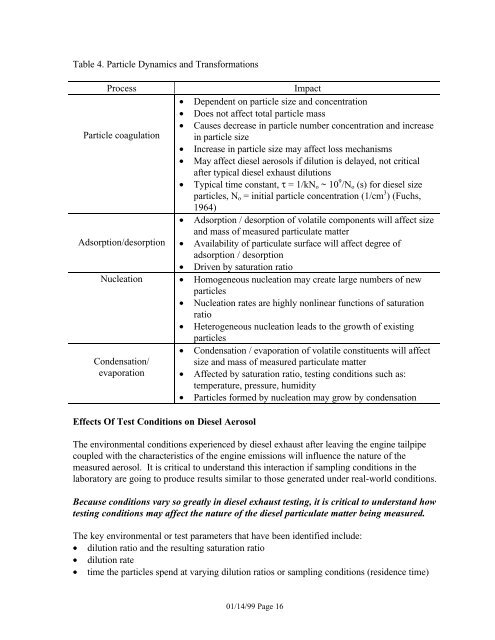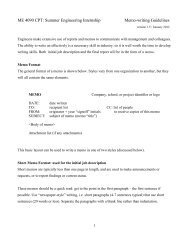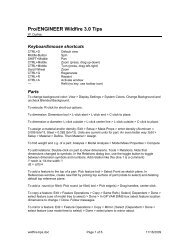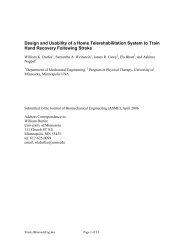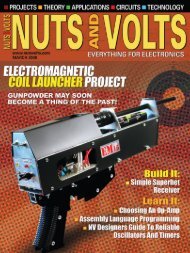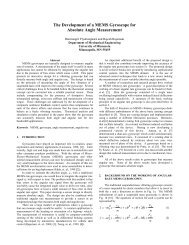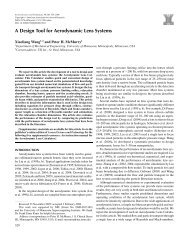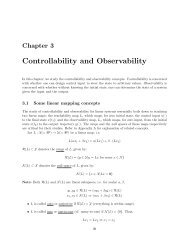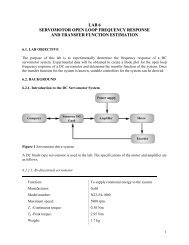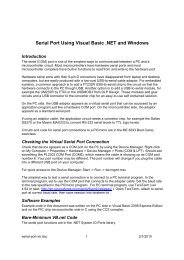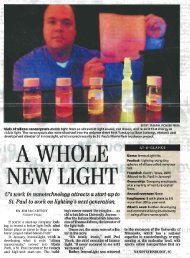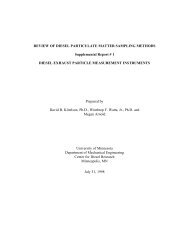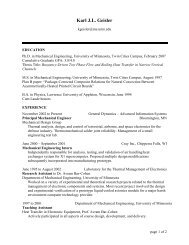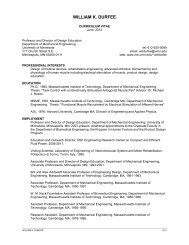Review of diesel particulate matter sampling - Department of ...
Review of diesel particulate matter sampling - Department of ...
Review of diesel particulate matter sampling - Department of ...
Create successful ePaper yourself
Turn your PDF publications into a flip-book with our unique Google optimized e-Paper software.
Table 4. Particle Dynamics and Transformations<br />
Process Impact<br />
• Dependent on particle size and concentration<br />
• Does not affect total particle mass<br />
• Causes decrease in particle number concentration and increase<br />
Particle coagulation in particle size<br />
• Increase in particle size may affect loss mechanisms<br />
• May affect <strong>diesel</strong> aerosols if dilution is delayed, not critical<br />
after typical <strong>diesel</strong> exhaust dilutions<br />
• Typical time constant, τ = 1/kNo ~ 10 9 /No (s) for <strong>diesel</strong> size<br />
particles, No = initial particle concentration (1/cm 3 ) (Fuchs,<br />
1964)<br />
• Adsorption / desorption <strong>of</strong> volatile components will affect size<br />
and mass <strong>of</strong> measured <strong>particulate</strong> <strong>matter</strong><br />
Adsorption/desorption • Availability <strong>of</strong> <strong>particulate</strong> surface will affect degree <strong>of</strong><br />
adsorption / desorption<br />
• Driven by saturation ratio<br />
Nucleation • Homogeneous nucleation may create large numbers <strong>of</strong> new<br />
particles<br />
• Nucleation rates are highly nonlinear functions <strong>of</strong> saturation<br />
ratio<br />
• Heterogeneous nucleation leads to the growth <strong>of</strong> existing<br />
particles<br />
• Condensation / evaporation <strong>of</strong> volatile constituents will affect<br />
Condensation/ size and mass <strong>of</strong> measured <strong>particulate</strong> <strong>matter</strong><br />
evaporation • Affected by saturation ratio, testing conditions such as:<br />
temperature, pressure, humidity<br />
• Particles formed by nucleation may grow by condensation<br />
Effects Of Test Conditions on Diesel Aerosol<br />
The environmental conditions experienced by <strong>diesel</strong> exhaust after leaving the engine tailpipe<br />
coupled with the characteristics <strong>of</strong> the engine emissions will influence the nature <strong>of</strong> the<br />
measured aerosol. It is critical to understand this interaction if <strong>sampling</strong> conditions in the<br />
laboratory are going to produce results similar to those generated under real-world conditions.<br />
Because conditions vary so greatly in <strong>diesel</strong> exhaust testing, it is critical to understand how<br />
testing conditions may affect the nature <strong>of</strong> the <strong>diesel</strong> <strong>particulate</strong> <strong>matter</strong> being measured.<br />
The key environmental or test parameters that have been identified include:<br />
• dilution ratio and the resulting saturation ratio<br />
• dilution rate<br />
• time the particles spend at varying dilution ratios or <strong>sampling</strong> conditions (residence time)<br />
01/14/99 Page 16


